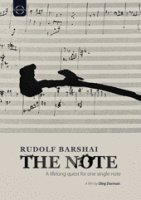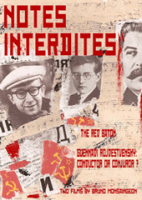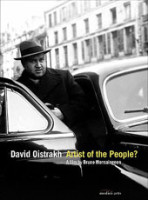Armchair Operas and Amusements 10.
|
Grant Chu Covell [September 2014.]
Oleg DORMAN: Rudolf Barshai: The Note (2012). EuroArts 2059528 (1 DVD) (http://www.euroarts.com/). Recorded in the months before his death in 2010, the Russian violist, arranger and conductor offers remembrances. We learn how Barshai (1924-2010) discovered music and about his artistic struggles in the Soviet Union. Friendships and collaborations with familiar Russian musicians such as Oistrakh, Richter and Shostakovich are highlighted. We’re also introduced to Barshai’s less familiar friends including composer Alexander Lokshin. We learn of Barshai’s various marriages, and see him and his third wife in Switzerland and environs. When he demonstrates conducting, it amazes to see how fluidly his arms and hands can move. The 89-minute documentary coalesces around the work that Barshai considered his most important: completing Bach’s Art of Fugue and producing a performing edition of Mahler’s Tenth (covered here). Barshai relates how Shostakovich endorsed a particular dissonance in his Bach completion, insisting that he never alter it even if pressured. We learn about how Barshai sought Mahler’s original sketches, and how he tried to decipher a particularly elusive chord, seeking “the note” of the title. The booklet recaps this moment. Unfortunately the English text mistranslates the particular pitch. Barshai’s passion for music is evident throughout. Whether or not it was evident to Dorman and Barshai at the time, they were capturing something very fragile. Barshai’s death is handled abruptly. It takes a few scenes to realize the funeral we are witnessing is the musician’s.
“Notes Interdites.” Bruno MONSAINGEON: The Red Baton: Scenes of musical life in Stalinist Russia (2003); Gennadi Rozhdestvensky: Conductor or Conjuror (2003). Idéale Audience 3073498 (1 DVD) (http://www.ideale-audience.com/). Without having been there, it is difficult to know what musical life was like in Stalinist Russia. Did the oppressive controlling state actually facilitate artists to focus upon their art? The stories told today by those fortunate to have survived at whatever expense are bittersweet. Monsaingeon confronts a difficult subject obliquely through a pair of meandering 55-minute films centering around conductor Rozhdestvensky. He includes an omnipresent narrator, interviews and fascinating archival footage along with many rhetorical questions. The Red Baton launches from Rozhdestvensky’s recollections of the difficulties, contradictions and absurdities Soviet artists faced, offering anecdotes specific to Shostakovich, Prokofiev and Richter. After the February 1948 Zhdanov decree that banned ambiguously defined “formalism” in music, Tikhon Khrennikov became the Secretary of the Union of Soviet Composers, thus controlling musical activities. Rozhdestvensky reveals how Khrennikov and others made life difficult for Shostakovich, Schnittke, Barshai, et al. Khrennikov himself eventually appears to explain that he was merely a party functionary who used his position to help and protect as many musicians and composers as he could. Monsaingeon doesn’t explicitly take sides, although his devotion to Rozhdestvensky’s narrative implies an opinion. Shostakovich’s quote reproduced in the digipak says it all: “Looking back, I see nothing but ashes and corpses.” Conductor or Conjuror affords opportunities to watch Rozhdestvensky at work. He coaxes a student struggling with Shostakovich’s Seventh, and later critiques himself conducting Tchaikovsky’s Romeo and Juliet. The art of conducting appears to be equally effortless and difficult. Rozhdestvensky discusses aspects of charisma and leadership that aren’t taught at conservatory. Material for this and The Red Baton was taped between 1991 and 2002. The DVD extras are a contradictory but straightforward pair. Dead Souls offers Rozhdestvensky conducting the Symphony Capella Orchestra in his own assemblage of Schnittke’s film score based upon Gogol’s novel. Some of the music also ended up in Schnittke’s own Sketches. Viktoria Postnikova (Mrs. Rozhdestvensky) takes a concertante solo piano role in a few of the suite’s humorous moments. There are gestures which Henry Mancini would have been proud to have used in the Pink Panther movies: various dances (polka, mazurka, galop, etc.), two insistent asynchronous metronomes, and players pretending to fall asleep. This being Schnittke, it all makes sense. We get to see Rozhdestvensky’s hands-off conducting style up close. He plays up the charades as if a circus MC and clown. The other DVD bonus is Prokofiev’s rarely heard Zdravitsa, Op. 85 (1939). Written after Prokofiev returned to the Soviet Union, this short cantata celebrates Stalin’s 60th birthday using texts “inspired by the people.” It can’t be endured today without irony, despite several fine Prokofiev moments such as the lovely orchestral introduction. Both Dead Souls (29:47) and Zdravitsa (14:36) were recorded in 2002.
Bruno MONSAINGEON: David Oistrakh: Artist du Peuple? (1994). medici arts 3073178 (1 DVD) (http://www.ideale-audience.com/). Monsaingeon offers an Oistrakh documentary (75:49) which also reveals much about artists’ endurance in the Soviet world. There’s compelling archival footage if you only want to see the great violinist play. The telephone conversation between Shostakovich and Oistrakh in which they discuss the Second Violin Concerto is certainly a high point. There are also perceptive recollections by Yehudi Menuhin, Mstislav Rostropovich and Rozhdestvensky. Gidon Kremer discusses what it was like to study and work with Oistrakh. According to Menuhin, Oistrakh owed his musical life to the regime and thus was both indebted to, and a prisoner of, the Soviet system. Is this a particular reading of the facts, or a suggestion of something more insidious? Monsaingeon poses this unresolved question early. Menuhin also suggests that the state simply worked one of its great artists to death, saddling Oistrakh with engagements and tours after a series of heart attacks.
[Previous Article:
Dowland’s Lachrimæ 1604: Update]
[Next Article:
Acoustic Revive’s RR-888 Schumann Resonance Generator]
|


